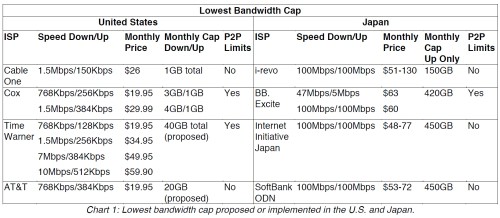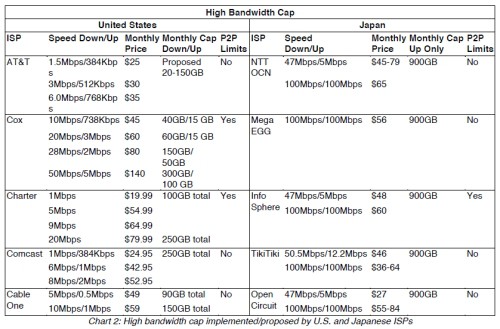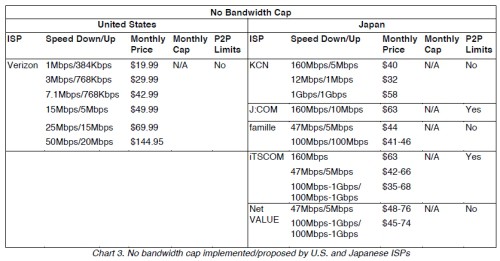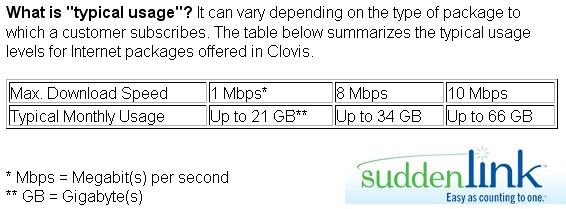Chiehyu Li and James Losey at the New America Foundation have completed an excellent comparison between broadband service overcharging schemes in the United States (and the slow speeds and high prices that accompany them), with broadband service in Japan, where download usage caps are unheard of, speeds reaching 1Gbps are priced at under $60 a month, and bandwidth throttling of peer to peer applications is uncommon at best.
Although services offered by Japanese ISPs are more expensive than these “economy plans,” they are not only much faster but offer considerably more flexibility in terms of bandwidth consumption. In Japan, the lowest cap for residential Internet of the companies we researched is 150GB per month for upstream only, implemented by i-revo, a nationwide fiber ISP that provides up to 100Mbps symmetrical access. BB Excite, SoftBank and Internet Initiative Japan (IIJ) also imposed 420GB to 450GB bandwidth per month only on the upload side.
Although pricing is higher for some of the “economy” plans in Japan, customers there have no risk of running into overlimit penalties and fees punitively placed on customers’ bills when they exceed the paltry caps usually found on Internet Overcharging “economy” tiers. With some charging $2-10 per gigabyte, it’s easy to send bills much higher with very little usage.
The report “demonstrates that bandwidth caps in the U.S. are more restrictive than in Japan. ISPs in Japan only cap upstream traffic, if at all, and few impose network management practices to limit bandwidth consumption. The results of this report should encourage policymakers to investigate market conditions in Japan to determine how and why their networks supports far more per-customer throughput than comparable networks in the U.S. Additionally, regulators and policymakers need to investigate why Japanese high-speed Internet subscribers get faster speeds at lower prices, with fewer limitations than subscribers in the U.S.”
Of course, it’s no mystery why American providers are seeking to impose various overcharging schemes on their customers — they want fatter profits, and will leverage the barely competitive broadband market to get them, especially if they think policymakers won’t respond with the appropriate oversight and regulation, where necessary, to protect consumers from monopoly/duopoly-leveraged pricing.
Even comparing the higher bandwidth caps in the two countries, including the highest priced residential plans, bandwidth caps in the U.S. are drastically lower and more restrictive than those in Japan. Chart 2 shows service options with the highest bandwidth cap in the two countries. U.S. ISPs such as Cox, Charter, Comcast and Cable One cap bandwidth from 20 GB to 250GB per month for combined up and downstream traffic for their higher-priced Internet services. Among these ISPs, Cox has the highest monthly caps, offering 300GB for downstream and 100GB for upstream to Ultimate Package subscribers (50Mbps/5Mbps). Comcast caps bandwidth at 250GB a month, combined upstream and downstream, for all tiered Internet services. Continuing the U.S. trend towards more restrictive Internet service, AT&T has proposed bandwidth caps of 20-150GB a month. In addition, some of these ISPs have imposed network management on users’ Internet traffic.
The United States has one major multiple cable system owner that has sworn off these schemes – Cablevision. A few competitors, including Grande Communications, found in Texas, also advertise they will not impose limits or schemes on their customers. Frontier Communications has promised its customers it will not enforce any limits on its broadband customers until further notice either (although we’d prefer they eliminate the 5GB Acceptable Use language from their terms and conditions). Verizon is perhaps the most important non-capper, at least for now. It has no current plans to implement Internet Overcharging schemes on its customers.
Once again, the United States is heading backwards in broadband pricing, speed, and freedom for customers to use their service as they see fit. Instead, providers with Internet Overcharging schemes seek to limit broadband usage to extract maximum potential profits, and protect their video business from online competition. The fundamental question for the future will be, who controls America’s Internet?


 Subscribe
Subscribe








